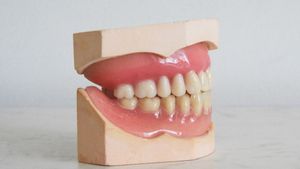JAKARTA - gum pain is a disturbing problem and occurs for a number of reasons such as brushing your teeth too hard, sariawan, wearing edifices, containers, or tooth wire. For women, this can be caused by hormonal changes, pregnancy, or menopause, and can occur around menstruation time. At other times, gum pain can be a sign of more serious oral health problems such as filtering, gum inflammation, or periodontitis.
Explore this home treatment to relieve gum pain quickly. Also make sure to learn the difference between when you can treat gum pain safely at home and when you have to meet a dentist.
Add 1 sdt. salt into one cup of warm water and stir evenly. Then, mouthwash and defecate thoroughly into the sink. Salt will help prevent the growth of bacteria in your mouth and reduce bacteria in the gums, which can cause swelling. Rins the mouth with warm salt water at least twice a day until the swelling subsides.
Try a hot or cold compress to help reduce pain.
For a hot compress:
For cold compresses:
Certain herbs and spices can be used as home remedies for inflammation and gum pain. Cengkeh powder and Spilanthes are both analgesic herbs (pain relievers). Both have been used as alternative relievers of verbal pain for a long time. The turmeric can also help relieve pain.
To use this treatment, mix the selected powder with a little warm water until it becomes pasta. Apply the paste directly to the gum until the pain subsides, then rinse the mouth with the water. Apply as often as needed.
Take a bag of fresh tea and soak in boiling water for up to 5 minutes, as you usually do when making tea. When the tea bag is cold enough to touch, attach it directly to the sick gum for at least 5 minutes.
Choose tea contains astringen in nature, such as black tea, green tea, or even shoe flower tea. Or choose tea containing anti-inflammatory sticks a popular example is ginger and camomil. Herbal anti-inflammatory will calm down, while tannin will absorb anything that irritates gums.
SEE ALSO:
General pain relievers and NSAIDs, such asctions, acetaminophene (Tylenol), and ibuprofen (Advil) can help in an emergency. If the pain is stubborn and the topical method above (or others) doesn't work, try this option. You can use it yourself or as an addition to topical home care. For the number of doses, follow the instructions on the bottle label.
The English, Chinese, Japanese, Arabic, and French versions are automatically generated by the AI. So there may still be inaccuracies in translating, please always see Indonesian as our main language. (system supported by DigitalSiber.id)


















